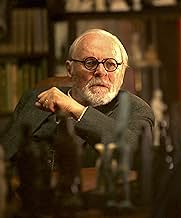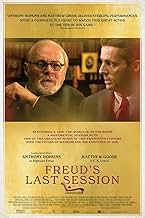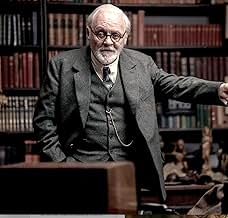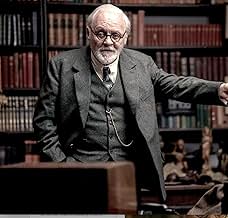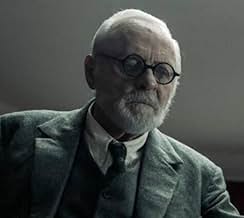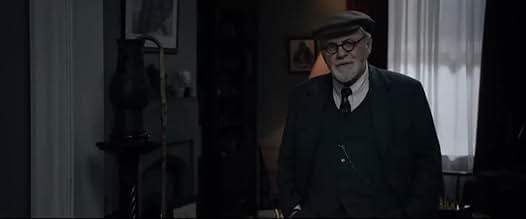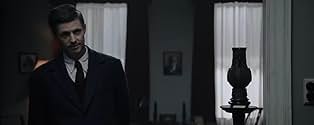In der Geschichte des Films lädt Freud den Kultautor C.S. Lewis zu einer Debatte über die Existenz Gottes ein. Und die einzigartige Beziehung zu seiner Tochter und Lewis' unkonventionelle Be... Alles lesenIn der Geschichte des Films lädt Freud den Kultautor C.S. Lewis zu einer Debatte über die Existenz Gottes ein. Und die einzigartige Beziehung zu seiner Tochter und Lewis' unkonventionelle Beziehung zur Mutter seines besten Freundes.In der Geschichte des Films lädt Freud den Kultautor C.S. Lewis zu einer Debatte über die Existenz Gottes ein. Und die einzigartige Beziehung zu seiner Tochter und Lewis' unkonventionelle Beziehung zur Mutter seines besten Freundes.
Bald verfügbar
Wird am 19. Dezember 2024 veröffentlicht
- Auszeichnungen
- 1 Nominierung insgesamt
George Andrew-Clarke
- Paddy Moore
- (as a different name)
Anna Amalie Blomeyer
- Ilsa
- (as Anna Blomeyer)
Handlung
WUSSTEST DU SCHON:
- WissenswertesAnthony Hopkins had previously portrayed C.S. Lewis in Shadowlands - Ein Geschenk des Augenblicks (1993) 30 years prior to this film.
- PatzerLewis is shown researching the Gospels while a woman who appears to be his wife calls him to bed. This film takes place in 1939, but Lewis did not marry Joy Davidman Gresham until 1956. The woman was actually Janie Moore, who Lewis lived with until 1949.
- Zitate
[last lines]
Sigmund Freud: From error to error, one discovers the entire truth.
- VerbindungenFeatured in The 7PM Project: Folge vom 19. April 2024 (2024)
- SoundtracksVariations on an Original Theme, Op. 36, 'Enigma' Variation 9: Nimrod
Composed by Edward Elgar
Performed by Symfonický orchester Slovenského rozhlasu (as Slovak Radio Symphony Orchestra) & Adrian Leaper (Conductor)
Licensed courtesy of Naxos Music UK Ltd
Ausgewählte Rezension
Hopkins playing Freud was bound to be hit or miss. Unfortunately, he delivers here one of his familiar, highly mannered performances. Whenever this "Freud" opens his mouth, he speaks in the same rapid, slightly eccentric rhythm Hopkins favors. Then he pauses, reflects a moment, flashes a sudden rueful grin, and utters a little chuckle or cackle. It's been Hopkins' default style throughout his career (at least when not playing Lecter), this time with a Viennese accent. I doubt Freud was ever so hammy.
My faith was also shaken early in the movie when, for no discernible reason, the order of two famous events was reversed. On September 3, 1939, Prime Minister Chamberlain announced over the radio that the nation was at war with Germany. A few minutes later, air raid sirens went off, terrifying London's populace. (It proved to be a false alarm.) For some reason, the movie has the false air raid preceding the declaration of war.
It also features, in connection with Chamberlain's broadcast, an old bête noire of mine: A large group of psychologists is listening to his historic speech on the radio, and when it's over, the BBC announcer says something like "That ends the Prime Minister's message" -- at which point someone (is it Anna Freud?) snaps off the radio. No one would do that in real life, with war just declared and with urgent government announcements yet to follow (and there were plenty of them).
One further complaint: the clumsy way flashbacks are shoehorned into the narrative, giving us the backstories of Freud, Lewis, and Anna, with a heavy emphasis on Anna's lesbianism.
Incidentally, considering that C. S. Lewis was one of the most brilliant speakers in Britain -- eloquent, persuasive, never at a loss for words -- he is uncharacteristically tight-lipped, timid, and hesitant in this movie, even for someone being courteous to a revered, dying old man. Armand Nicholi's fanciful book "The Question of God," one of the inspirations for this movie, lets the two iconic figures battle it out, with Lewis (and God) ultimately gaining the upper hand. But in this movie's version of that imaginary encounter, Lewis has little to say. It is all Freud's show.
At least the movie is handsomely mounted; it's nice to see what Freud's office must have looked like. That aside, I can't see the point of the movie. Is it just to give Hopkins the chance to do another bad impersonation of a historical figure?
My faith was also shaken early in the movie when, for no discernible reason, the order of two famous events was reversed. On September 3, 1939, Prime Minister Chamberlain announced over the radio that the nation was at war with Germany. A few minutes later, air raid sirens went off, terrifying London's populace. (It proved to be a false alarm.) For some reason, the movie has the false air raid preceding the declaration of war.
It also features, in connection with Chamberlain's broadcast, an old bête noire of mine: A large group of psychologists is listening to his historic speech on the radio, and when it's over, the BBC announcer says something like "That ends the Prime Minister's message" -- at which point someone (is it Anna Freud?) snaps off the radio. No one would do that in real life, with war just declared and with urgent government announcements yet to follow (and there were plenty of them).
One further complaint: the clumsy way flashbacks are shoehorned into the narrative, giving us the backstories of Freud, Lewis, and Anna, with a heavy emphasis on Anna's lesbianism.
Incidentally, considering that C. S. Lewis was one of the most brilliant speakers in Britain -- eloquent, persuasive, never at a loss for words -- he is uncharacteristically tight-lipped, timid, and hesitant in this movie, even for someone being courteous to a revered, dying old man. Armand Nicholi's fanciful book "The Question of God," one of the inspirations for this movie, lets the two iconic figures battle it out, with Lewis (and God) ultimately gaining the upper hand. But in this movie's version of that imaginary encounter, Lewis has little to say. It is all Freud's show.
At least the movie is handsomely mounted; it's nice to see what Freud's office must have looked like. That aside, I can't see the point of the movie. Is it just to give Hopkins the chance to do another bad impersonation of a historical figure?
Top-Auswahl
Melde dich zum Bewerten an und greife auf die Watchlist für personalisierte Empfehlungen zu.
- How long is Freud's Last Session?Powered by Alexa
Details
- Erscheinungsdatum
- Herkunftsländer
- Sprachen
- Auch bekannt als
- Freud's Last Session
- Produktionsfirmen
- Weitere beteiligte Unternehmen bei IMDbPro anzeigen
Box Office
- Bruttoertrag in den USA und Kanada
- 906.283 $
- Eröffnungswochenende in den USA und in Kanada
- 45.590 $
- 24. Dez. 2023
- Weltweiter Bruttoertrag
- 3.160.133 $
- Laufzeit1 Stunde 50 Minuten
- Farbe
Zu dieser Seite beitragen
Bearbeitung vorschlagen oder fehlenden Inhalt hinzufügen

Oberste Lücke
What is the Canadian French language plot outline for Freud: Jenseits des Glaubens (2023)?
Antwort





